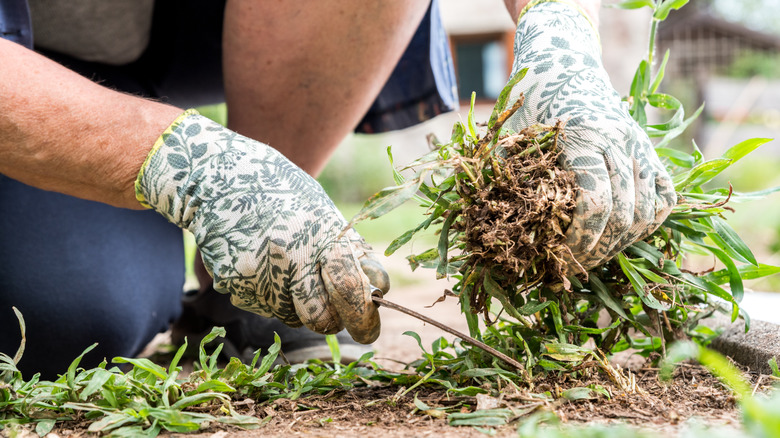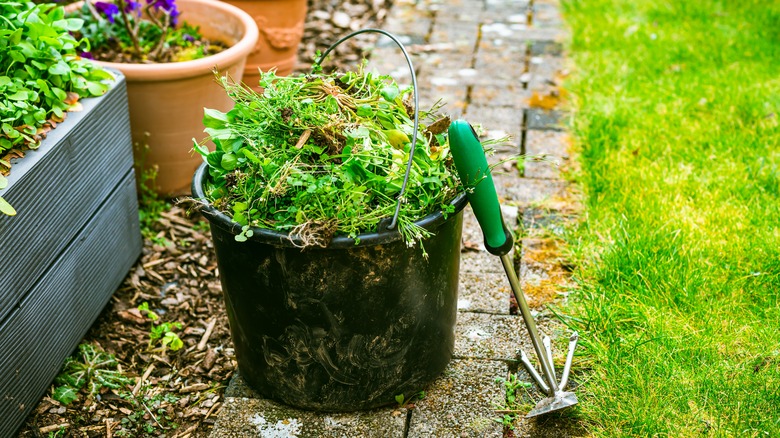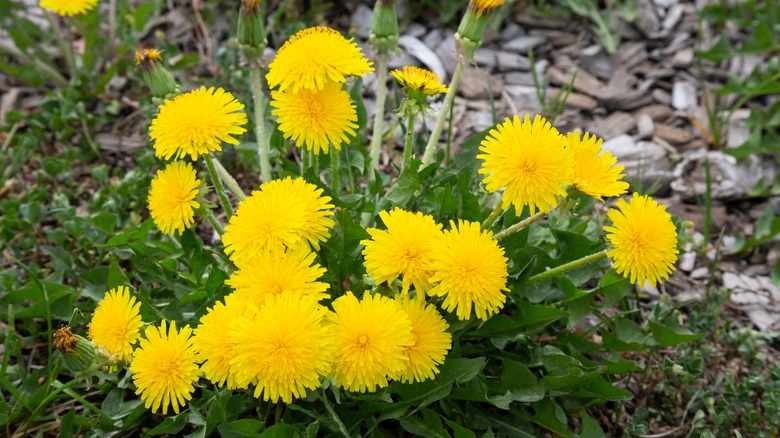The Unexpected Way You Can Actually Repurpose Weeds In Your Garden
Ask any homeowner what gives them the most heart palpitations about tending to their garden and they will almost always tell you that it's the weeds. Finding weeds among your precious plants can be a cause of frustration, as it can require lots of work to pull them out of your soil. Luckily, though they're a nuisance to remove, they can actually be put to good use. After yanking out all of the parasitic intruders from the soil, instead of throwing them out or burning them, make them work for you by forming a nutritious weed tea that will fertilize your garden. This can be done by steeping the weeds in a bucket of water.
While weeds are the bane of gardeners, in reality, they're just like any other plant that's made of organic materials. Because of this, you can harness their benefits for the good of your plants by brewing up a mean pot of weed tea. In fact, several common garden weeds contain decent amounts of nutrients including nitrogen, phosphorus, and potassium, which are the big three components of NPK fertilizers. Therefore, by creating a weed tea for your plants, you can save yourself some money, as it will provide your garden with the same nutrients that an expensive fertilizer would. Also, there's no need to worry about your tea leading to further weed growth, as when you strain the liquid, you'll also get rid of all the seeds that cause the spread of the intruders.
Save the weeds in a bucket and fill it with water
Weed tea is essentially made by allowing weeds to decay in clean water and using their constituents to fertilize your garden. Since weeds compete with your plants by nabbing all the soil's nutrients, this is quite the befitting end for them. To make your garden a nutritious batch of weed tea, begin by weeding your garden as you normally would. Gather up all the greenery and place it in a large bucket. You can choose to wash them, but since you'll be sieving out the liquid afterward, this isn't actually necessary. Crush them to pieces with your gloved hands to help them break down faster.
Next, fill the bucket up with clean, non-chlorinated water at a ratio of 8 cups of water for every 1 pound of weeds. Stir the plants in the water and then cover the container with a mesh cloth or net to protect it from bugs. Let the weeds steep for up to four weeks before straining out the tea with a mesh cloth. Make sure you stir every day during the stewing period. To use the tea, first dilute it with fresh water and then pour it around your plants or spray it directly onto the leaves for faster absorption. You can use this mixture once every two weeks at the most. When applying, wear gloves, as the mixture could stain your hands.
Weeds to look out for and stay away from
When you're making your weed tea, it's easy to just snatch up as many weeds as you can find and throw them into a bucket, but you have to keep in mind that not all weeds are created equal. In the same way that you have to curate your meals to be as healthy as possible, you must also carefully select the weeds that will form the fertilizer for your garden. You wouldn't want to accidentally uproot a poison ivy plant because putting that on your growing produce, which you'll consume later, could be disastrous. In fact, avoid using any toxic plants in your tea mixture, which also includes poison hemlock, poison oak, and pokeweed.
There are also weeds you should look out for that offer more nutrition than others. Dandelions aren't just "magical" plants built for making childlike wishes — they are also jam-packed with nutrients, so much so that some believe they're even beneficial when consumed. They contain iron, magnesium, calcium, and potassium, among other nutrients. Further, stinging nettle has nitrogen, potassium, and phosphorus, as well as antifungal properties that could potentially protect your garden from diseases or pests. Other beneficial weeds include lamb's quarters, chickweed, and burdock. If your yard is mostly weed-free, throw in grass cuttings from your mowing sessions to supplement the weeds. The level of nutrients differs between grass types, but they all contain the basic beneficial elements like phosphorus and magnesium.


